How Rus' became Lithuanian
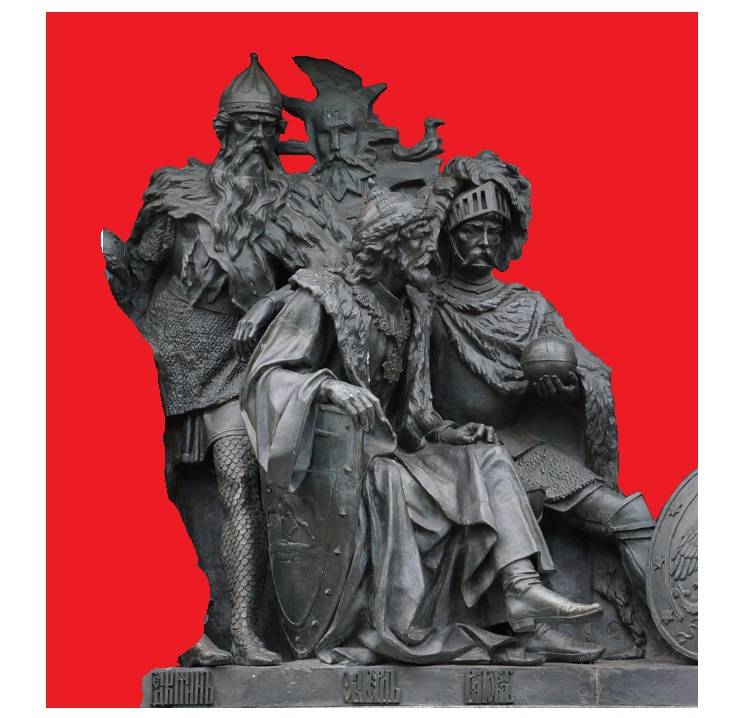
Gedimin, Olgerd and Vitovt at the Millennium of Russia monument. Sculptors M. Mikeshin, I. Schroeder and architect V. Hartman. 1862
After the Tatar-Mongol invasion in the western and southern parts of Ancient Rus', exactly the same social processes took place as in the northeast. Interaction and communication between the Russian lands continued. Kyiv, despite the fact that it fell into complete desolation, for some time was still considered the "golden table" of Rus' and was constantly in the orbit of attention of the princes of the northeast.
The right to the capital of the Russian state was always supported and defended by the grand dukes of the northeast, even when Kyiv and the surrounding territories were occupied by Lithuania, and then became part of the Commonwealth.
irreparable damage
The Tatar-Mongol invasion caused enormous damage to these lands. From the analysis of the researcher A. A. Gorsky, it follows that only 31% of the settlements were restored in the Galicia-Volyn land, and 22% of the settlements in the Kyiv land. Southern and western Rus' was on the direct route to Europe, where the nomads were aimed, therefore both destruction and pogroms were significant here. In addition to the destruction of cities or the general massacre of the population, as in the city of Berestye, which was also in the Vladimir-Suzdal land, the Tatars drove the male population into hashar (in Persian - the crowd), which was spent as cannon fodder in battles and sieges. Master Rogerius (d. 1266) wrote about the Russians, Hungarians and Cumans used in this way.
The constant threat from the close Horde aggravated the position of the region, however, as well as the north-east of Rus'. A small territory of the "Russian Land", part of the steppe territory of the Chernigov and Pereyaslav principalities, became part of the Horde directly.
In the west of Rus', Russian princes in the period from the 1201th to the beginning of the 1263th century, following the economic and military weakening of the cities, spent their military potential on achieving personal benefits, honors and momentary benefits. When the Mongols besieged and stormed the cities of Volyn, Prince Daniel with his son and brother was in Poland. Prince Daniil Romanovich (1279-1280) was equal in strength and power to Yaroslav Vsevolodovich and his son Alexander. After the Mongol invasion, he was able to gather under his rule the Galician, Volyn, part of the Kyiv and Turov-Pinsk lands. His son, Lev Danilovich in XNUMX (XNUMX) tried to capture the whole of Lesser Poland, historical center of Poland. But the descendants of Daniel, and in general the Russian princes in these lands, remained in the paradigm of pre-Mongolian reality, being engaged exclusively in campaigns and the extraction of tribute from neighboring lands. While historical necessity required the creation of new state structures, as happened in the northeast of Rus'.
But if only the Tatars were an external enemy there, the west of Rus' (modern territories of Belarus and Ukraine) was also threatened by neighboring state formations, such as Hungary and Poland, but especially the Lithuanian tribes uniting at that time. Coincidentally, they were at the stage of transition from tribal to territorial-communal system.
Russian volosts were undermined by Tatar raids and tributes, the loss of external sources of income from foreign neighbors. The Russian princes and their squads lost their source of livelihood, and the princes lost their squads, since its members had the right to choose their service and left to serve more successful princes.
In such a situation, the Lithuanian tribal unions, which were at the stage of the collapse of the tribal organization, at the stage accompanied by military expansion, began to seize the western and southern lands of Ancient Rus'.
What was Lithuania?
The Lithuanian tribes (Aukshtaite) were at the tribal stage of development, staying in the XNUMXth-XNUMXth centuries. tributaries of neighboring Russian lands, while often raiding them. In the XIII century, the Lithuanians are disintegrating tribal relations. A tribal union is formed, which some researchers mistakenly consider a "state". This stage of development is characterized by aggressiveness, expansionist aspirations, campaigns for wealth in the name of prestige.
The formation of this tribal union was associated with the ongoing aggression on the part of the German orders against the pagan Lithuanians, and with campaigns by the Russian princes for tribute.
The Lithuanian "autocrat", and in fact the leader Mindovg (1195-1263), let us not be misled by magnificent titles, defeated his Lithuanian rivals, defeated the knights in the battle of Saul (Siauliai) in 1236 and in the battle of Lake Durbe in 1260. Taking advantage of the situation in Rus', the Lithuanians captured Black Russia (the lands along the upper reaches of the Neman and the cities of Grodno, Novgorodok, Slonim, Volkovysk), making the Russian Novogrudok their capital. The seizure of Russian lands by Lithuania began.
Already at the end of the XNUMXth century, the once powerful Russian Principality of Polotsk, now divided into Vitebsk and Polotsk, fell under the control of Lithuania for the first time.
The further process of the formation of the Grand Duchy of Lithuania (GDL), which is often called Russian-Lithuanian in the literature, will be associated with the permanent inclusion of Russian lands in its composition.
Lithuania goes to Rus'
If the northwestern volosts of Russia coped with the German threat with the help of princely squads and their militias, whose forces were not undermined by the Tatar-Mongol invasion, then the defeated volosts of the south and west did not have such forces, but in an alliance with each other, which was necessary for defense, they could not enter, because (and we return to this point again) they were "sovereign" city-states with historical grievances among themselves. A complex search began for ways to get rid of the Tatar-Mongol threat.
In such circumstances, the city-states, by tradition, began to go to the “row” (agreements) with Lithuania. For example, Polotsk with the Samogitian prince Troynat (Trenyat), the murderer of Mindovg, with Volhynia and Smolensk. The Lithuanian princes, when necessary, pursued a flexible policy, adhering to the principle: “We don’t destroy the old, but we don’t introduce new ones.”
They "dressed up" (agreed) with a more developed society, so they did not seek to interfere in the sovereign rights of Russian cities at the initial stage.
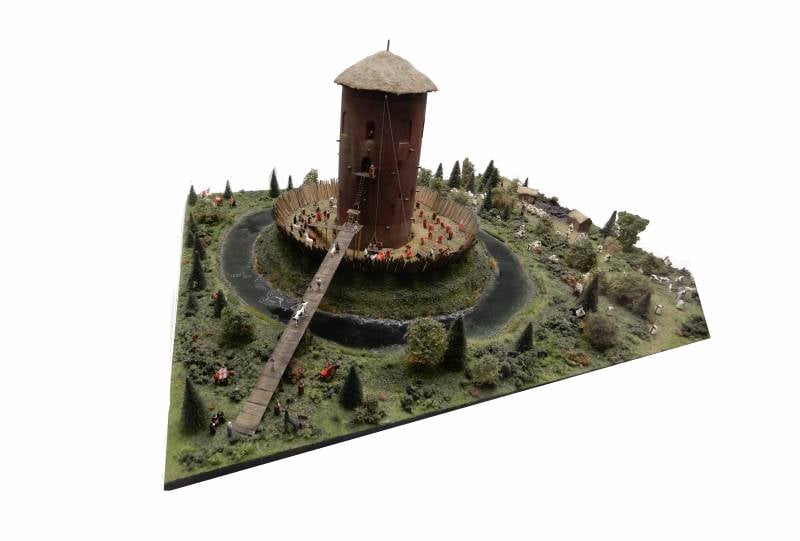
Kamenetskaya tower. XNUMXth century Kamenets. Brest region Reconstruction. Museum of Miniatures. Minsk. Photo of the author.
When we talk about the weakening of the military potential of the city, it should be understood that individual volosts could not resist the global threat of raids, but the cities still had their own militias.
The militia of Vitebsk and Polotsk, Smolensk, city-states, which the Tatars did not reach, constantly act in alliance with the Grand Dukes, including against Moscow. The Polotsk militia fought on the Kulikovo field in 1380, and the regiments of Smolensk, Vitebsk and Mstislavl participated in the battle on the Green Field (Grunwald) in 1410.
But soon the situation changes.
Already Prince Gediminas (1275-1341), seeing the weakness of Russian cities and princes, began campaigns to conquer them. In 1315, Gediminas captured Berestye and Dorohochyn. In 1324, Gediminas set out on a campaign against Kyiv, where a certain prince Simeon ruled, defeating the Russian princes on the way to him. Here, the grandchildren of Lev Daniilovich, Leo II and Andrei Yuryevich, who had not coped with the Lithuanian force back in Galich, also died.
It is significant that the war for the Galich and Volyn principalities went on with varying success between Poland, Lithuania and Hungary. The once powerful Russian lands, whose princes acted on equal terms with all neighboring countries, have now become a battlefield for them.
In the middle of the XIV century they lost their independence: the west of the Volyn volost and Galich were occupied by Poland. The territory of Poland doubled, in 1375 the second Catholic archbishopric in Poland was already created here, and the capital of the land was transferred to Lviv, the Polish king became the king of Poland and Rus'.
Transcarpathian Rus was captured by Hungary, Northern Bukovina went to the Moldavian principality, and Volhynia became part of Lithuania. Lithuania captured all the Chernigov principalities bordering the steppe and Bryansk. The struggle with Moscow for the Smolensk volost begins.
As part of Lithuania
The western and southern lands of Rus' fall under the rule of the Grand Duke of Lithuania. The Russian language was the state language here, the customary law of Russian volosts was used, and the chronicle was kept in Russian. But the assumption that in the period under review there was an alternative for the ancient Russian lands with two centers of collecting lands, Moscow and Lithuania, is an extreme modernization. The Grand Duke of Lithuania built the Lithuanian "previously state" on the basis of the Russian lands, using and exploiting the territories that fell under his rule.
In the Middle Ages there were not and could not be multi-ethnic states with equality of ethnic groups. Any presence of several ethnic groups in one potestar association was determined by a strict hierarchy, where there were subordinate and dominant ethnic groups.
The same applies to Ancient Rus' and Russia. Multinationality is the reality of today, which they are trying to attribute to the situation of the period of subjugation of Slavic tribes by Russia, which, of course, was not.
The Slavic colonization of Eastern Europe was accompanied by either the expulsion or destruction of the Finno-Ugric tribes, for example, in the northeast and northwest of Rus'. The tributes that we hear about in Ancient Rus' are not a tax on the population of the Russian land itself, free tributes were not paid if they were not taxed during the numerous clashes of the lands. So, Novgorod and Pskov took tribute from the Finnish tribes, Polotsk and Smolensk - from the Baltic, Suzdal and Rostov - from the Finno-Ugric peoples. Galich, Vladimir and Volyn - from the Balts.
It was because of the tribute from foreign ethnic groups that Russian cities fought. The same smerds are not serfs, not feudal dependent peasants, but foreign tributaries: Balts and Finno-Ugric peoples who found themselves in long-colonized territories. The same applies to Lithuania, which was not a "confederation" of Russians and Lithuanians, but an early state of the Lithuanian ethnos.
Later, Ambassador Herberstein rightly notes that the Russian people are under the control of three states: Poland, Lithuania and Moscow. But only one of them was Russian.
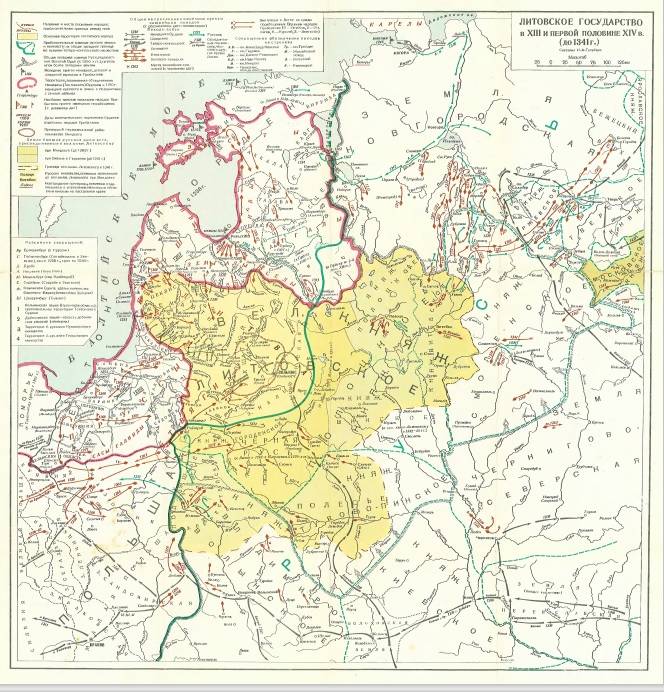
Map of Lithuania. XNUMXth century
The foundation of the early Lithuanian state was the Russian lands, which were based on a territorial community. Therefore, the power of the Lithuanian princes, which has a single center, seems to be more stable at the initial stage, in contrast to the power of the Russian princes in the northeast.
With the outward similarity of the goals and actions of the Moscow and Lithuanian grand dukes, there was an important difference: Lithuania, which again united the Russian principalities of the south and west of Ancient Rus', lagged behind the occupied Russian lands in socio-economic terms, which did not contribute to progress in their state building in the long run.
Where is the Horde?
The Tatar-Mongol invasion and the subsequent economic exploitation of Rus' by the steppe had a significant impact on economic and social relations in these territories. The nomads did not have mechanisms that could change the socio-economic path of development in Eastern Europe.
The process of unification of lands under the Grand Duke of Moscow and Lithuania led to the concentration of forces and made it possible to begin an effective struggle against the Horde. But it was only an outward appearance. For Western and Southern Rus', in fact, it was a change of one master to another. And it was with the Tatars, when using the Russian forces for the Russian lands, that Lithuania fought the Horde.
In 1362, Olgerd Gediminovich (1296–1377) defeated the Tatars at Blue Waters, subjugating Kiev, Podillya, Posemye and Pereyaslavl South, which, however, did not save these lands from paying the Horde exit. There was a victory in the battle, but not in the war with the steppe. In the 90s. The Horde again restores its power here south of the Blue Waters (a tributary of the Southern Bug). The offensive policy on the steppe was continued by Vitovt the Great, who sheltered Tokhtamysh and received a label on the lands to the Black Sea. Already in 1399, in the Battle of Worksla, Timur-Kutluk and Idegei (Edegei) defeated the Grand Duke Vitovt.
The Tatars devastated the Lithuanian possessions, took Kyiv, and Vitovt paid Timur-Kutluk 3 thousand rubles. What prompted Vitovt to go for a stronger rapprochement with Poland.
From Lithuania to Poland
Both Lithuania and Poland were threatened by the technologically and socially more advanced Teutonic Order. The crusaders terrorized the indigenous lands of Lithuania and sought to "punch a road" through the Lithuanian Samogitia to Livonia. And Poland during the XIII-XIV centuries. already suffered significant land losses associated with the capture of the Vistula Pomerania by the Teutonic Order.
Both countries, having a common threat, began to draw closer. Which would lead to their strengthening in confronting the German danger and would remove the issue of the paganism of Lithuania, which could accept Catholicism from Poland. The act of Krevo or the union of 1385 implied that the Grand Duke of Lithuania Jagiello would marry the 12-year-old Jadwiga, daughter of Louis of Anjou, receive the Polish throne, and Lithuania with all the lands of Rus' would be baptized and become a vassal of Poland. The latter categorically did not suit the Lithuanian nobility and was cancelled. Jagiello Olgerdovich became the Polish king, and Vitovt, the son of Keistut, became the Grand Duke of Lithuania.
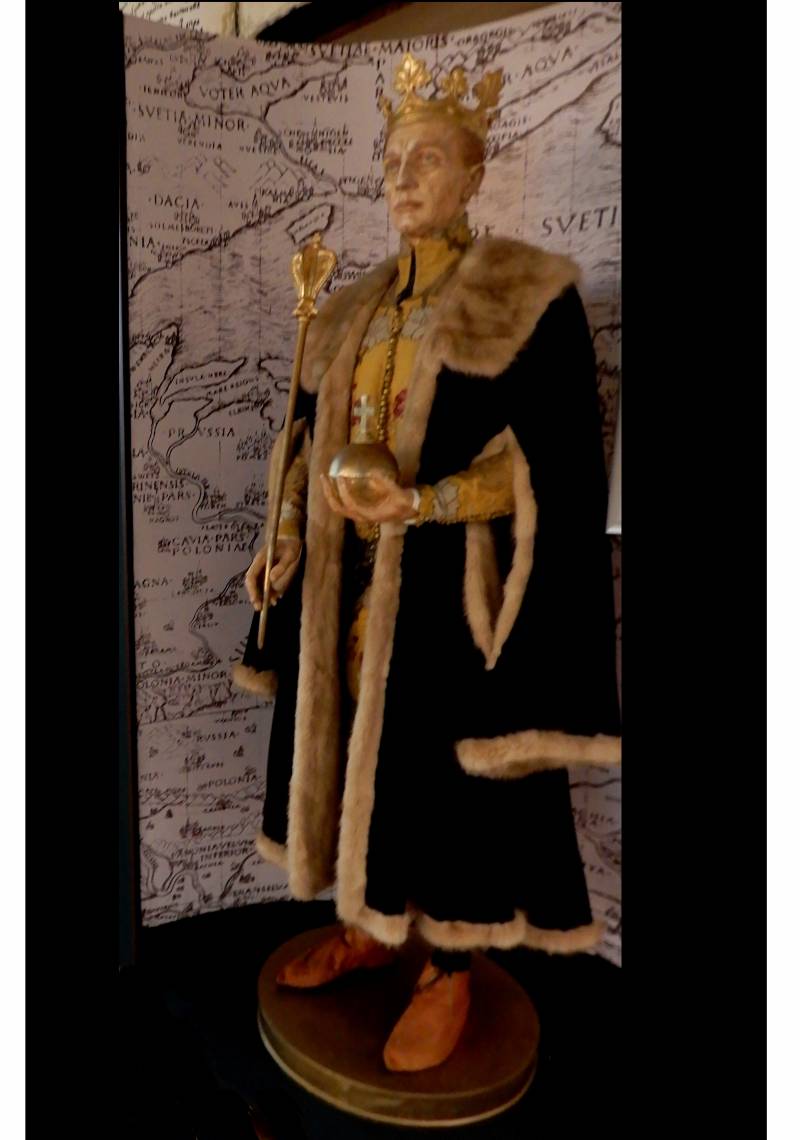
Grand Duke of Lithuania Jagiello. Reconstruction. Authors P. Luk, Y. Peskun. Minsk Historical Museum. Belarus. Photo of the author.
The unification made it possible not only to successfully fight the Germans, the famous victory at Grunwald in 1410 confirmed this, but also to go on the offensive, so Lithuania received Samogitia. And it was beneficial for the Polish nobility to “move” to the east, capturing the former Old Russian lands that were part of the Grand Duchy of Lithuania by non-military means.
Thus, the colonization or polonization of the eastern lands became the most important and priority goal of the Polish ruling class and the nobility of the Grand Duchy of Lithuania, which entered into a “union” with them, actively adopting new experience. Of course, these were not actions caused by some kind of planning. The process was gradual, stemmed from the logic of historical development (where it is weak, it breaks there) and took several centuries.
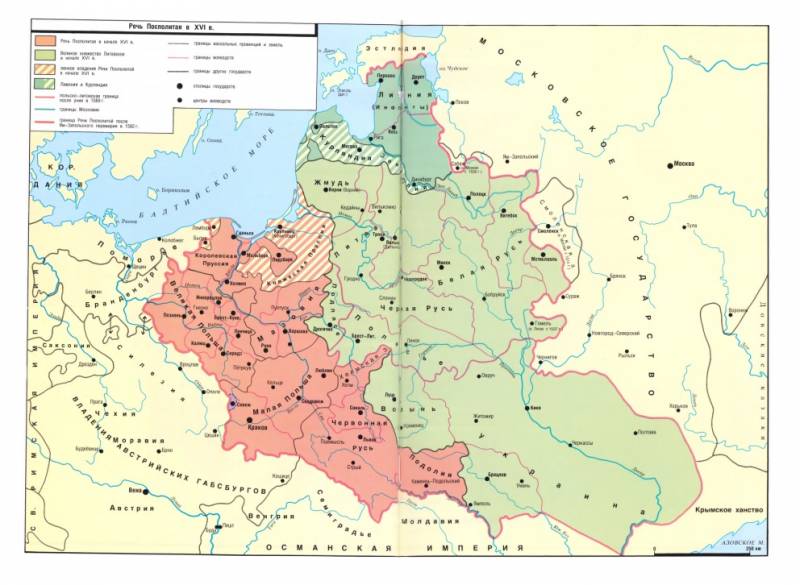
Map of Poland and Lithuania. XNUMXth century
Poland, its early feudal system with the rights of feudal lords of all levels, was extremely attractive for the princes and service people of the GDL, and in their eyes stood much higher than the orders in the GDL, being a model of social relations, fashion and weapons.
The baptism of the Lithuanian pagan nobility into Catholicism consolidated the superiority of Poland in the union, although the Lithuanian and Russian nobility close to them resisted the subordinate place in the union.
In 1413, according to the Grodel's decree or act of law, the Polish gentry also received the Lithuanian nobility of the Catholic religion, and the Orthodox nobility received the same rights only 20 years later. This happened after a fierce struggle during the civil war in the Grand Duchy of Lithuania in 1432-1447. When one part of Lithuania stood for rapprochement with Poland, and the other part, mainly the Russian lands or the “great Russian principality”, led by Prince Boleslav-Svidrigailo Olgerdovich (d. 1452) - against the processes initiated by the union.
But this struggle on the part of the Lithuanian and Russian nobility of the “Great Russian Principality” was not successful due to the diverging goals and objectives of the participants, starting with their leader. Since this struggle was not for the equality of lands and cities of different ethnic groups that fell under the union, but for personal privileges. Each sought to receive personal "privileges", and having received them, he was ready to retreat from the common struggle. Svidrigailo was an extremely controversial figure, “...supported in this by the Russians,” wrote Jan Dlugosh, an author of the XNUMXth century, “who loved Skirgaila very much, as belonging to the same Greek rite.”
With the election of the Grand Duke of Lithuania Casimir IV, son of Jagiello (1422-1497) in 1447 as the Polish king, the union between Poland and Lithuania became personal, from 1569 - interstate.
With the development of new social relations, the division of labor, which resulted in the formation of "estates", in the conditions of introducing new orders from the outside (Magdeburg city law), the old Russian institutions either lost their significance or faded into the background. When in the lands that fell under the control of Lithuania, the process of disintegration of the old volost orders, due to the reasons that we have already written about, took several centuries, then on the lands occupied by Poland, this happened much faster. Poland was already an early class state, and its system was as perfect as it could be in the Middle Ages. The process of Polish feudalization of the rural population began in Galician Rus already at the end of the XNUMXth century. With the unions of the XNUMXth century, it also occurs in other Russian territories.
If after the Tatar-Mongol invasion all parts of Ancient Rus' developed in the same way - within the framework of the communal-territorial system in the XIV-XV centuries, then from the end of the XV century these paths diverge.
So for a long time the evolutionary path of state development was interrupted for the former Old Russian lands in the south and west of Eastern Europe.
Продолжение следует ...
Information